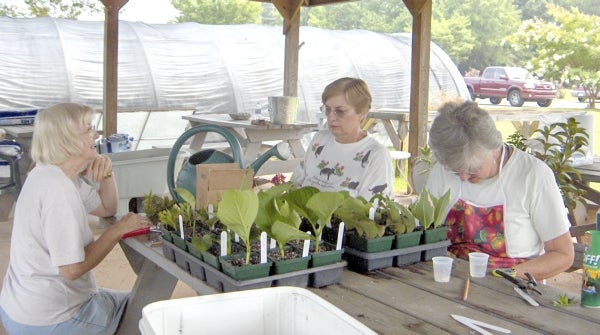Master Gardeners to have plant propagation workshop
Published 12:00 am Friday, July 1, 2016

- Cooperative Extension A propagation class will be offered July 13 at Cooperative Extension. This photo is from a previous class.
By Carole Massey
Extension Master Gardener Volunteer
On Wednesday, July 13, Rowan County Extension Master Gardeners will conduct a Plant Propagation Workshop from 9 a.m. until noon at the Agricultural Center on Old Concord Road.
The class will be held at the Outdoor Learning Center next to the greenhouse. Space will be limited to the first 25 to call and register. To register, call the Cooperative Extension office at 704-216-8970. There is a fee of $20 for materials and supplies.
A second workshop will be held on Wednesday, July 27. Register for this class also, same time, same place, same $20 fee applies.
Extension Master Gardener Jean Lamb and other Extension Master Gardener volunteers will provide instruction and information on basic propagation techniques. While the instruction remains the same, plant material varies from year to year and results do as well.
When taking cuttings for propagation, new growth from healthy, relatively young plants will give the best results. Cuttings from popular ornamental shrubs work best when the cutting is from a new tip growth that is green, vigorous and snaps when bent. If the tip bends and does not snap, the growth is too juvenile.
Plants should be well irrigated prior to cuttings being taken. If there has not been significant rainfall, water the plant well the day before taking cuttings. Plants under stress will not do well.
Cuttings from old wood or aged or declining shrubs will be difficult to propagate. Shrubs should be insect- and disease-free. Cuttings should be taken the morning of the workshop if at all possible. Transport soft-stem cuttings in a cooler with ice or in a container of water. Cuttings need not be excessively long.
Participants are encouraged to bring enough plant material to share with others. Recommended plants for propagation include most ornamental shrubs, including all varieties of butterfly bushes, hydrangea and azalea, mock orange, crape myrtle, spirea, weigela, gardenia (upright and trailing varieties), holly, roses, chaste tree (vitex), Kerria, viburnum and beauty berry.
Some conifers will do well, others not so much. Camellias will propagate; they just take a while to mature. Don’t forget the vining plants and herbs. Clematis and lavender would be two examples.
Master Gardeners will bring cuttings from their home gardens as well as furnishing cuttings from the Pocket Gardens around the Ag Center. When filled, the propagation trays will be nurtured in the greenhouse until fall. At that time, a potting up session will be scheduled, with Master Gardeners to assist, and the new plants will be ready to be taken home.
Participants are encouraged to come by and check on their cuttings during the summer to see their growth and development. For questions or additional information, contact the Cooperative Extension office, 704-216-8970 or e-mail danelle_cutting@ncsu.edu




